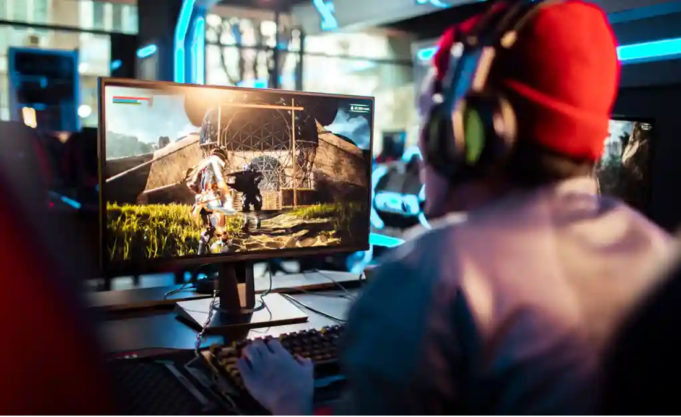Today we are going to look at a very important topic that is often discussed in modern society – the connection between games and motor development. This topic has been the subject of scientific research for many years and different studies show different results. Video games, especially those that require speed and interactivity, often require precise hand-eye coordination and quick decision-making. Studies show that when such skills are used on a regular basis, the development of positive qualities is rapid. Therefore, in this article, we will analyse whether video games really improve motor skills and other mental qualities and provide facts to confirm or refute this theory.
How Action Games Improve Hand-Eye Coordination
It’s worth starting with the benefits, and one of the most well-documented benefits is its effect on hand-eye coordination. First-person shooters, Battle Royale, or even MOBAs require quick reflexes and precise movements. Scientists have noticed that regular gaming and training in certain esports disciplines can lead to the improvement of sensorimotor skills, which are necessary to perform a number of tasks.
For example, a study conducted at the University of Rochester showed that avid FPS players demonstrated better hand-eye coordination and reaction time compared to other people far removed from the gaming industry. The need to keep an eye on fast-moving objects and characters, aim accurately, and react quickly trains the brain to process visual information more efficiently. These skills are used not only in games but also by athletes, surgeons, and even pilots.
In addition, several factors affect performance, one of which is the setting of parameters in the game. Tools such as the valorant sensitivity calculator help players fine-tune control settings for optimal accuracy. By adjusting the mouse sensitivity or headphone volume correctly, a player’s performance changes. This personalization allows players to develop more consistent and refined motor skills over time.
The Role of Puzzle and Strategy Games in Cognitive-Motor Skills
These types of video games mentioned above, such as FPS, MOBA, and other action-based entertainment, would be of great assistance in reflexes and reaction speeds; however, puzzle and strategy games offer significant contributions towards cognitive-motor development. For instance, real-time strategy (RTS) and turn-based strategy (TBS) games demand multitasking skills, resource management, as well as tactical planning. They cease to be mere entertainment and become a very true and taxing mental activity. The necessary game mechanics bring the executive functions of the brain to action, which enhance the speed of decision making and the flexibility of thinking.
As studies indicate, there have also been improvements in fine motor control yielded from playing puzzle-type games by the young players. Thus, the action of repeated complex usage of a mouse, keyboard, or controller strengthens neural connections which relates to movement precision.
Esports Training and Its Impact on Motor Skills
With the development of the gaming industry, esports has become an important part of it and has grown into a strong economic sector. But this is not the only benefit of esports, as it can also be used for education, development, and other useful purposes. Professional gaming takes serious training into the corridors of motor skills practice. Unlike just playing games, the e-sporting activity is marked by unbroken precision, a fast response rate, and being able to perform under pressure. Studies of esport athletes have revealed that the reaction speeds of many of them are comparable to those of professional athletes in sports. For example, it can be compared to a race car driver who, of course, is an extraordinary person who could quickly react to events while driving on his track.
A recent part of research published in Nature Human Behavior emphasized that elite competitive players have among the best visuomotor skills. Compared with the average person, such players can track many moving objects and perform very accurate motions significantly better. Muscle memory, on the other hand, is an important factor for efficiency of the play, including cognitive load reduction and fast reactions. However, it should be noted that it is possible only to a certain extent; spending too much time in front of the computer won’t do much benefit.

The Impact of VR and Motion-Controlled Games on Physical Coordination
And finally, it’s worth mentioning modern technologies. Virtual reality (VR) and motion-controlled games are introducing new vigor into motorskills development and several other specific but worthy abilities. Unlike traditional games, where players sit at a desk and simply use a keyboard or joystick, VR games engage gross motor skills by requiring full-body movement. For example, in titles such as Beat Saber and Superhot VR, the difference between being entertaining and at the same time needing for spatial awareness, balance, and hand-eye coordination in a 3D environment sets them apart.
Research shows that these games can also act as rehabilitation tools in VR. Most often, people recovering from strokes or injuries use the virtual reality (VR) system to regain control of their motor abilities. It imitates real-life movements in a virtual environment created under controlled digitally simulated conditions:bordered inside by walls and by the sounds of cellular phones ringing and computers humming. All set to develop motor skills in both children and adults.
Of course, there are some downsides, such as the cost of these devices and the limited selection of games. However, as the technology advances, VR is likely to improve significantly—offering more affordable devices for a broader audience and introducing a wider variety of exciting new games to suit all tastes.
Conclusion
Bringing all the facts together, it can be confirmed that games, when used correctly, truly have a positive impact on motor skill development. They offer a unique form of cognitive and physical training, from improving hand-eye coordination in FPS games to enhancing strategic thinking in strategy games. Esports players also often demonstrate an impressive reaction time comparable to professionals in traditional sports, while VR technology expands the potential for full-body coordination training. As gaming technologies and related industries continue to evolve, their application in motor skill development is likely to expand, offering new insights into how digital experiences shape human abilities.












